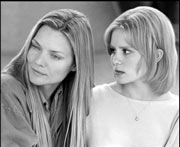WHITE OLEANDER
directed by Peter Kosminsky
opens Oct. 11 at Meridian, Metro, Oak Tree, and others
It’s not my editorial policy to assign anime films to anime geeks, or Jackie Chan movies to Jackie Chan fans. There’s a target audience for every genre, but I think it’s a critic’s job to avoid being caught in those Hollywood crosshairs. Otherwise, reviews get mighty predictable. And besides, I get to learn something new.
I’ve never watched Oprah; I’ve never read a book she’s recommended (sorry, Jonathan Franzen). But do I regret being subjected to the mawkish, mediocre White Oleander (based on a 1999 Oprah Book Club pick)? Not at all! Here are just some of the valuable things I learned about coming of age as a young woman while your mother (Michelle Pfeiffer, no less) is in jail for murder: Wear what’s given you. If your first white-trash born-again foster mother (Robin Wright Penn) is a former stripper and coke addict who forces you into frilly panties, pink outfits, and baptismal frocks, go with it, girl. Bide your time. Work on your sketchbook (mom is also an artist). Eventually she’ll decide that you’re hot, and a potential rival for her hunky live-in boyfriend, then shoot you in a drunken rage.
Having survived, the resulting photogenic collarbone entry-wound scar may not earn you street cred in reform school, but there you can intimidate Latina gangster chicas by chopping off your flaxen hair and threatening such bullies with a shiv. Now a pariah, your androgynous charm may attract the interest of a gentle, shaggy-haired aspiring teen cartoonist (Patrick Fugit of Almost Famous), but don’t sleep with him. Kiss? OK, but dump him immediately thereafter.
Why? Because you’re a hardened survivor—tough, the way your mamma raised you to be. (“Love humiliates you; hatred cradles you,” says Pfeiffer during one visit to the pen. Thanks a lot, Mom; wouldn’t tips on eyeliner be more useful?) That way, when a fragile but well-meaning Hollywood starlet (Ren饠Zellweger) takes you in to her posh Malibu home, lavishes you with designer clothes and bottled water, and confides in you her doubts about her director husband (Noah Wyle), you’ll be prepared for even more tragedy ahead.
It’s a lot for one girl to endure. (And let’s not even start with foster mom No. 3.) Astrid (Alison Lohman) narrates her own tale of hardship and survival from the position of an adult woman. Constructing suitcase shrines to the chapters of her past in a spacious N.Y.C. loft, she may be a scrappy tattooed bohemian, but she’s also learned to put the past, as they say, behind her.
AS A MOVIE, Oleander is like an odd throwback to the serials, an adventure-filled progression of cliff-hangers that might be called The Emotional Perils of Pauline. Astrid confronts danger at every turn, but the film’s gravest threat is that which she faces from her own mother. Ingrid, you see, is bold, brave, talented, glamorous, sexy, and free-spirited (this is Michelle Pfeiffer we’re talking about), but you know what?—she’s also a heartless bitch.
In other words, as Astrid comes to realize over the course of many adolescent changes of hairstyle and makeup (Oleander is a little vague about the actual span of years), Mom’s sheer, silky selfishness is a sin. Thinking only of herself and the fickle lover whom she jealously poisons (Billy Connolly), Ingrid places her own happiness above that of her daughter. And to atone for that, well, that’s what Oprah is for. By the time Astrid nears 18, and her mother’s earned a new trial, the stage is set for an interminable mother-daughter confrontation scene to hash out their old grievances and secrets.
“Being with someone so dangerous was the last time I felt safe,” muses the adult Astrid in one of her many voice-over passages. Such frequent fidelity to literature might be justified were Janet Fitch’s 1999 novel literature. It’s not. Oleander constantly lauds the power of art with the worshipfulness only the nonartist can supply. Ingrid’s art sustains her in prison as Astrid’s does during her foster-home odyssey, but their efforts are merely symbolic, not insightful, transmuting personal experience into personal iconography like a pile of wadded-up, teary tissues. It’s product, not profundity.
In the end, as Ingrid tries to leverage her fierce, caged heart over a resentful daughter’s looming independence (demanding false testimony that might set her free), Nietzsche gives way to Hallmark. One minute Ingrid is spouting, “Loneliness is the human condition.” The next . . . well, Oleander is a high-concept producer’s picture (courtesy of ER‘s John Wells), so poor parenting must be redeemed in a kind of sweeps-week, season-ending finale. Ingrid is bad, and Pfeiffer plays her with effectively steely-eyed self-absorption, but she can’t finally be all that bad or the book never would’ve been invited to join the club.









